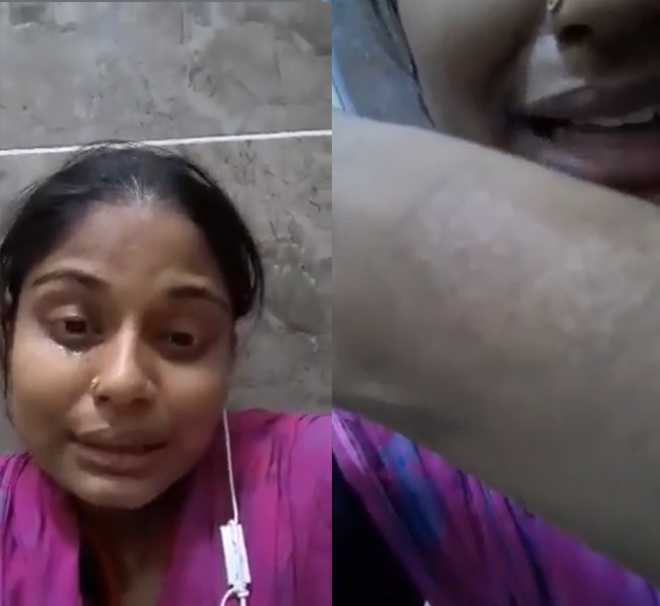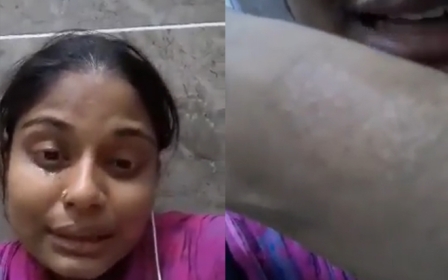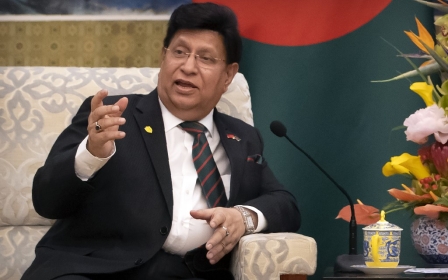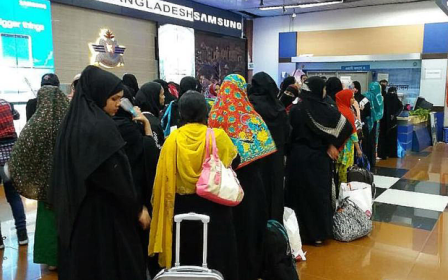Bangladesh maid who said Saudi employer poured 'hot oil' on her returns home

A Bangladeshi maid who said her Saudi employer had poured hot oil on her arms was repatriated back to Bangladesh on Friday morning after fleeing the abusive household in Saudi Arabia.
Sumi Akter, like thousands of her compatriots, left Bangladesh several months ago in the hope of better job opportunities in the Gulf kingdom.
But instead, the 25-year-old said her employer deprived her of food, beat her and sexually assaulted her during her time working in the Saudi city of Jeddah.
In videos posted online, Akter said she was passed on to other Saudi households where she faced the same type of abuse, fearing that she would come home dead instead of alive.
"I perhaps won't live longer. Please save me. They locked me up for 15 days and barely gave me any food. They hit me and then burned my arms with hot oil," Aktar said in her native Bengali as she wept and showed burn marks on her arms.
New MEE newsletter: Jerusalem Dispatch
Sign up to get the latest insights and analysis on Israel-Palestine, alongside Turkey Unpacked and other MEE newsletters
"They took me from one home to another one. In the first home, they tortured me and hit me repeatedly and then took me to another one where I experienced the same."
Akter went back to Bangladesh in the early hours of Friday morning. At Dhaka airport she was met by local officials, according to a representative from the Building Resources Across Communities (BRAC), a Bangladeshi NGO.
Following an international outcry and calls by Bangladesh for Akter to come home, Saudi police had taken her to the Bangladeshi consulate-general in Jeddah.
But her repatriation was delayed after Akter's employer refused to sign "final exit" papers unless money they claimed to be owed for bringing her into Saudi Arabia was repaid.
A Saudi labour court, however, rejected the employer's plea for compensation and said that they were not owed any money.
More abuse victims set to return
Noyon Amin, a caseworker for BRAC, told Middle East Eye on Friday that other women who faced a similar situation to Akter were due for repatriation in the coming days.
"We have been in contact with Sumi and helped her out where possible to ensure she was safe and given the proper assistance to come back home," Amin said.
"For now, our primary focus is helping Sumi and the other women who had fled abuse in Saudi Arabia. This will include ensuring they get the right medical help and psychological assistance to be reintegrated back into society."
Amin noted that some of the women face the prospect of being ostracised from their families due to stigma surrounding sexual abuse in Bangladesh.
He said that the women coming back had either faced physical or sexual abuse, unpaid salaries or their passports being taken away from them.
"Some of the women will be taken to a BRAC safe house where they will live until they are ready to take the next step in their life," said Amin.
Conversation starter
Akter's plea for help sparked a conversation in Bangladesh and rare protests demanding the government do more to help female workers in Saudi Arabia.
Her video also came after the body of a female migrant worker was repatriated to Bangladesh from Saudi Arabia in late October.
Figures compiled by BRAC noted that, in 2019 alone, the bodies of 48 female workers, whose death was linked to abuse, were brought back to Bangladesh from Saudi Arabia.
Earlier this year, the Bangladeshi government also admitted for the first time that a number of women had returned home from Saudi Arabia because of sexual abuse. At least 300,000 Bangladeshi women have travelled to Saudi Arabia for work since 1991, according to the Ministry of Expatriates' Welfare.
Bangladesh's foreign minister, Abdul Momen, recently ruled out the prospect of a complete ban on females being sent to Saudi Arabia for work purposes. Remittances are the second-biggest source of income for Bangladesh's economy.
Middle East Eye delivers independent and unrivalled coverage and analysis of the Middle East, North Africa and beyond. To learn more about republishing this content and the associated fees, please fill out this form. More about MEE can be found here.




